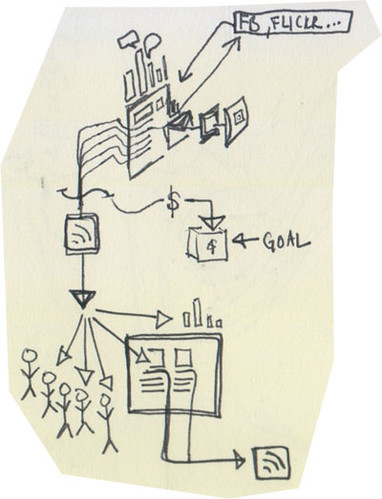Yesterday, April 9, was the 100th day of 2012. How do I know this? Because it was also Day 100 of my little “Resolution 2012” project, wherein I strive to write something creative every day. Perhaps it’s time to take stock of what I've "accomplished."
1) About 32,000 words, including this post. Not bad, though not as much as I had originally hoped. That said, in the last few weeks, a crazy work schedule and a bit of a creative lull have combined to slow my daily output. I initially tried to compensate somewhat by attempting the NaPoWriMo thing, but it has been an unmitigated failure. OK, maybe not unmitigated, since I do have the start of a reasonable poem to show for it, but most of the “poetry” I’ve written over the past nine days would barely qualify as horrible prose. I’m not sure I’ll continue to bother with it.
2) Twenty published posts (including this one) on my two blogs, plus several others that I wrote but didn’t bother to publish. In both cases, this is already far ahead of previous years’ outputs. Yay for me!
3) Six or seven poems started, though most if not all need some serious polishing. Still, I am unaccustomed to this kind of output in recent years, so something is definitely working. I’m not sure if I’ll have the makings of a year-end chapbook, but I’ll certainly have some good material to work with.
4) Quite a few “placeholder” entries. I won’t even bother going back to count them, but it must be at least 15, and perhaps closer to 20. A 20-percent “slacker” index is nothing to be proud of, but I went into this knowing there would be days I just didn’t have the energy to write anything more than “Hi Mom.” So my built-in failsafe seems to have worked… mostly… which brings me to my most shameful admission...
5) Two missed entries. I had really hoped to have an entry for every day this year, but that is not to be. While I was in Cleveland playing The Magic Flute, I missed days 79 and 84. After the first miss, I chalked it up to my absorption in the project and decided to forgive myself. And to be honest, these projects always sap a lot of my emotional energy. I have trouble focusing on anything other than the music, and it takes a huge effort of will to get any other work done. My entries for that week are mostly reflections on how I was feeling; in other words nothing more than diary entries. Nothing wrong with that. In fact, it’s probably the way to go if I’m not going to forget to write during my other musical projects this year. But in retrospect, I am a little disappointed that I wasn’t able to at least write two words on those two days.
6) Where do I go from here? By the ides of March, I was feeling very encouraged. I’d written some decent poetry, my blog writing was going well, and I felt like I was back in the writing groove. Then work got really crazy, and suddenly it was as if my brain said “no!” and my inspiration plummeted; I’ve written very little of any consequence since then. But I have enough experience with creativity to know that it goes in cycles, so I’m not too worried. And to be honest, this project has been a fun ride. I’m looking forward to writing a year-end wrap up.





